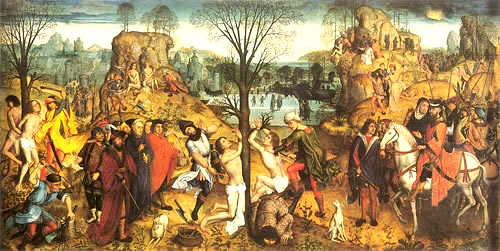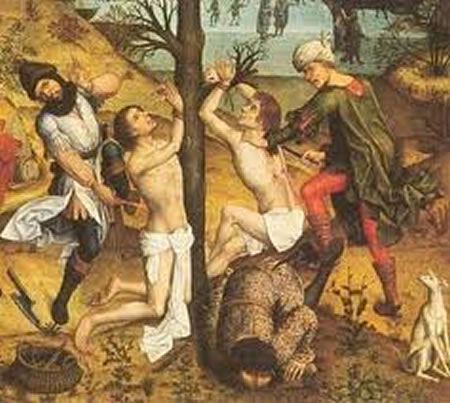
SAINTS
+ MARTYRS + CRISPIN + CRISPINIAN
Dear
Crispin and Crispinian,
Brave brothers of Christian lore who lived and
worked and died together, please
hear my prayer, and intercede with God
for me. You worked with leather, making sandals
and shoes, and perhaps satchels
and blacksmith's aprons. Your handiwork
aided others and protected them from harm.

You, however suffered great harm and torture,
and were eventually killed for your faith
and your love of the Crucified Christ.
Safe now, your labors over, you wear
the golden crowns of martyrs, and dwell forever
in the Ivory cloud halls
of
the Kingdom of Heaven
Protect me now, I pray you, good saints,
with your prayers before the throne
of our Creator, Merciful Lord
and Eternal King.
Amen

NOTE
- Saints Crispin and Crispinian, twin brothers,
are the French Christian patron saints of cobblers,
tanners, and leather workers. Legend has it that
they were born
to a noble Roman family in the 3rd century AD,
fled persecution for their faith, ending up in
Soissons, where they preached Christianity to
the Gauls and made shoes
by night.
Their
success attracted the ire of Rictus Varus, the
governor of Belgic Gaul, who had them tortured
and thrown into the river with millstones around
their necks. They survived, but were beheaded
by the emperor c. 286.
An
alternative account describes them as sons
of a noble Romano-Briton family whose father had
been killed, having incurred
the displeasure of the Roman emperor living at
Canterbury. As they were approaching maturity
their mother sent them to London
to seek apprenticeship and to avoid coming
to the attention of their father's killer. Traveling
there, the brothers came across
a shoe-maker's workshop in Faversham
and decided to travel no further. A plaque
in Faversham commemorates their association with
the town. A flaw in this account is
its failure to explain how the brothers came to
be martyred. Crispin is associated
with the Battle of Agincourt as the encounter
was fought on October 25, Saint Crispin's feast
day, as Shakespeare mentions
in his history play, Henry V.